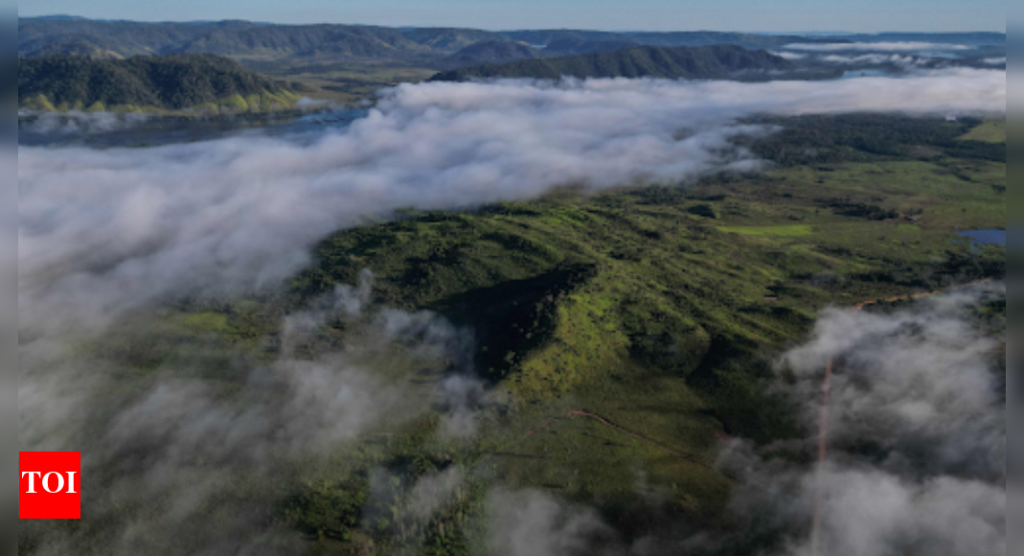Listen to the article
AI-generated disinformation has emerged as a significant threat to climate discussions ahead of the UN’s COP30 summit, with a flood of fake content specifically targeting the host city of Belem in the Brazilian Amazon, according to a new report released Thursday.
The Coalition Against Climate Disinformation (CAAD) documented a concerning 267 percent increase in climate misinformation related to the upcoming conference, identifying more than 14,000 examples between July and September alone. This surge comes at a critical time when public understanding of climate policy is essential.
One particularly troubling example includes a widely-circulated video purporting to show catastrophic flooding in Belem. Researchers at the Observatory for Information Integrity (Oii) determined the footage was entirely fabricated. “The reporter doesn’t exist, the people don’t exist, the flood doesn’t exist, and the city doesn’t exist,” they stated in their analysis.
Despite being flagged to TikTok, the platform has not removed the AI-generated video, which fails to disclose its artificial origins. This video is just one of several false narratives suggesting Belem is unfit to host the crucial climate conference. Other deceptive content included footage actually filmed in Tbilisi, Georgia, and recycled videos from events that occurred two years prior.
These instances are part of a broader trend of AI-manipulated climate content circulating throughout 2025. Earlier this year, AFP investigated a document falsely attributed to Elon Musk’s Grok 3 AI that wrongfully dismissed the credibility of climate models developed by the Intergovernmental Panel on Climate Change.
The persistence of such disinformation is particularly troubling given recent research showing that more than 80 percent of people actually support stronger climate action. Additionally, 69 percent of respondents indicated willingness to contribute one percent of their monthly income toward climate initiatives.
However, the report highlights a significant perception gap: both United Nations Environment Assembly attendees and the general public vastly underestimate this collective willingness to mobilize for climate action.
“This is the impact of climate disinformation,” CAAD stated in their report. “Big Carbon’s spending and Big Tech’s algorithms are preventing us from seeing and hearing one another online. Instead, we’re exposed to one lie after another.”
In Brazil specifically, climate science denialism has taken on political dimensions. Carlos Milani, professor at Rio de Janeiro State University, noted that these false narratives often lead to intimidation of scientists and climate activists. “Climate denial in Brazil is pushed most explicitly by far-right figures, a small group of anti-environmentalist activists and ultra-conservative leaders,” he explained.
The report comes as governments and international bodies begin taking more concrete steps to address online disinformation. The European Union’s Digital Services Act represents one significant effort, aiming to increase transparency and accountability among digital platforms and advertisers.
There are positive signs of progress at the international level as well. Information integrity has for the first time been placed on the United Nations agenda, a development CAAD describes as movement “finally headed in the right direction.”
As COP30 approaches, the challenge of distinguishing fact from fiction in climate discussions continues to grow more complex, with AI technology making disinformation cheaper, easier to produce, and increasingly difficult to detect. The report underscores the urgent need for platform accountability and media literacy to ensure that critical climate policy discussions aren’t derailed by synthetic content designed to mislead the public.
Fact Checker
Verify the accuracy of this article using The Disinformation Commission analysis and real-time sources.




8 Comments
This is a worrying trend. AI-generated disinformation can be extremely difficult to detect and combat. I hope the climate summit organizers are working closely with fact-checkers and researchers to stay ahead of these deception campaigns.
Me too. Raising public awareness about this issue is key. We all have a responsibility to be critical consumers of online content, especially around important events like this.
I’m glad to see the Coalition Against Climate Disinformation documenting these concerning trends. Fabricated videos like the one depicting flooding in Belem are particularly insidious, as they can easily sway public opinion. We must remain vigilant and demand accountability from social media platforms.
Agreed. Transparency and fact-checking are essential to combating these tactics. The public deserves access to accurate, reliable information on the critical issues being discussed at COP30.
The 267% increase in climate misinformation related to COP30 is staggering. This highlights the urgent need for robust policies and technological solutions to address the spread of AI-generated falsehoods. Preserving the integrity of climate discussions has never been more crucial.
It’s deeply concerning to see AI-generated disinformation campaigns targeting the upcoming COP30 climate summit. The fabricated footage of flooding in Belem is especially troubling, as it undermines public understanding of the critical issues at hand. We must remain vigilant against such misinformation efforts.
Absolutely. These malicious tactics erode trust and distract from the real work that needs to be done. It’s crucial that social media platforms take swift action to remove this kind of content and prevent its further spread.
This is a worrying development. AI-generated disinformation campaigns have the potential to significantly undermine the important climate discussions at COP30. I hope the summit organizers and global leaders are taking proactive steps to identify and counter these threats.